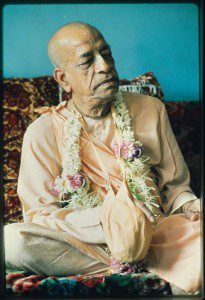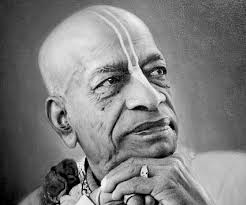Imagine, if you will, boarding a cargo ship at 69 years-old to leave your home country for the first time in your life. You’ve set out on a month-long journey to go to a country where you don’t know one single person.
During the journey you suffer from sea sickness, dizziness, vomiting and also have two heart-attacks. After 37 days you arrive in the United States of America with an umbrella, a small supply of dry cereal, about forty Rupees ($7.00), several boxes of books and your life-long mission to bring Krishna Consciousness to the West.
This is the story of A.C. Bhaktivedanta Swami Prabhupada, founder of ISKCON (The International Society for Krishna Consciousness) and how he brought Krishna Consciousness to the West.
Swami in a Strange Land, by Joshua M. Greene, is an exceptionally well-written biography that intricately chronicles a story of love, devotion, courage and possibility. Prabhupada’s life story beautifully demonstrates the quintessential example that “You can start with nothing, and out of nothing and out of no way, a way will be made.”
I had the opportunity to speak with Greene to delve deeper into what is difficult to comprehend, as to how Prabhupada accomplished all that he did, given his humble beginnings.
BJB: In addition to faith, surrender, and perseverance, what spiritual space did Prabhupada (1896-1977) have to occupy to bring Krishna Consciousness to the West?
JG: I don’t know that it’s possible to grasp the answer to this particular question unless you have been very far down the path yourself.
From our mortal perspective, that kind of determination seems utterly impossible. I ask myself all the time, “How did he get on that boat?”
I can give you platitudes, along with the three years of research I did for Swami in a Strange Land, and site chapter and verse on things he said, but I think to get inside the skin of that you really have to awaken some level of God.
It’s important to understand something central to Prabhupada’s legacy which is, in this moment we are capable of doing more than we could ever imagine.
Two things that I have learned studying Prabhupada’s books:
- There is more that I can do than I credit myself as being capable of doing.
- Never, ever judge what I’m seeing by its appearance. There is so much more going on beneath the surface. The mystery is very profound and we do ourselves and everybody else a tragic disservice when we judge things by their appearances.
My great privilege is I knew him. I traveled with him in different countries and I spent a long time with him under varying circumstances, and I’ve seen in him what it means to love God. The impression that I’m left with is that if you’re in love, anything is possible.
BJB: When Swami Prabhupada arrived in the U.S. what was the essence of his mission that attracted so many followers?
JG: The essence of his mission was that we are not the body. We are eternal souls, sparks of God.
“I am not this body. This body is the vehicle that is carrying me around.” The depth of meaning of that simple statement is mind boggling. To actually understand and live under that level of realization could be a game changer.
If I had to give you one message, it would be that, with the following post-script, due to countless births in this material world we have forgotten that we are the eternal soul that animates the body and now identify with our external temporary circumstances. That is where sadness comes from, where fear, bitterness and anger come from when we identify with our provisional condition.
Awareness of ourselves can be revived by a very simple practice, and that is chanting the holy name of God, “Hare Krishna, Hare Krishna, Krishna Krishna, Hare Hare.”
Chanting stimulates consciousness.
Sound is the original creative element and is the most penetrating of elements. If you vibrate the proper sound, it revives our sleeping consciousness and the awareness of ourselves as eternal beings. Sound is considered to be a regenerative element because it sets creation in motion.
BJB: What is the biggest misconception about Krishna Consciousness and how does it differ from that of religion?
JG: The biggest misconception is that it’s a religion.
Religion is a social and ethical structure that serves an important purpose, which is to create a blueprint for the smooth functioning of a community. It points to the deeper truths, and the deeper levels of religion show parallels of similarity in the language and the concepts.
Ideally, religion includes spirituality. Sadly most religious leaders are confused about their spiritual identity and have a hard time guiding their communities, and so things tend to not go to those deeper and more mystical levels. They remain on the level of reinforcing “our community”, which means that “our community” is different than that other community. Now you’ve created another division.
The advantage of Krishna Consciousness is that the Sanskrit texts are very comprehensive. They are extremely detailed in explaining the workings of creation, the nature of consciousness, the process of reincarnation, the qualities of material nature and how the cosmos operates.
BJB: One has to have a level of curiosity to remain non-judgmental with regards to the visual appearance of the cleanly shaven head and the saffron cloth for dress.
JG: When Prabhupada came to the west 50 years ago, the Vaishnava culture, which is the Krishna worshipping tradition of India, had not ever planted roots in Western soil. There’s been a lot of experimenting in terms of how closely the external form of that tradition should adhere.
At what point does an aesthetic distance from the trappings of that culture begin to compromise its content?
I’ve gone back and forth on this one ever since I left temple life, which was in the 80’s. I lived in temples for 13 years. After Prabhupada passed away in 1977, it took me another five years before I decided it was time for me to go back into the bigger world to live what I had learned from him.
For some people, staying full-time in the temple is absolutely correct. Prabhupada liked when someone took up full-time temple life. He knew they would be protected in that environment and make fast spiritual progress by being in good company, and having the deity worship and sanctified foods around them all the time. But he never insisted on it, not once.
I can tell you from experience the farther you distance yourself from the security of that Sangha, the riskier it becomes. We are influenced by our circumstances and the people around us.
BJB: “The challenge Prabhupada left his followers was to define the role of consciousness in progressive human society…” which “has been a work in progress.” Please elaborate on this challenge and how the role has been defined thus far.
JG: The world around us has shifted since Prabhupada first came here. We’re learning how to adapt this in the most effective ways for the world we now live in, that’s why I call it a work in progress.
There was a time when our spiritual progress was a matter of going away from the world, focusing on our own internal work and achieving an awakening of our spiritual self. That’s still true, but the time for doing that in isolation is long gone. The world is way too interconnected now.
Our spiritual progress today is intimately connected to the contribution we make to the progress of the community around us.
When people get together what binds them is the purpose, and having something that they do together as a group. I’ve seen communities dissolve because all they had was their own philosophy, or spiritual teachings, without a real sense of how this applies practically in the larger world.
That’s why I left temple life. I needed to know how I live this in the larger world. I had to do that separate from the temple. I’ll be candid in that I do miss it.
When Prabhupada was preparing for the mission his teacher gave him while he was in his 20’s, it took him until he was 69 years-old to finally get on the boat. During all of those years, he was going to his teacher’s Ashram and relished the company of Devotees.
“It took Prabhupada forty years of poverty and obscurity before he was at last able to leave India and begin spreading Krishna Consciousness to the rest of the world. During that time, his businesses failed, his marriage dissolved, his letters to India’s leaders were ignored, and fellow disciples offered little encouragement. Still, he kept on, writing English commentaries of Krishna’s teachings, publishing essays that challenged reductionist scientific explanations of life, and securing the papers needed to leave India.”
When he came here he was all alone.
The first thing he did was to create temples so that other people could have the benefit of good company. He knew from his own experience how important it was to be able to do that as a group.
BJB: With obstacles, setbacks and merely being alive on the planet today, how does one maintain enthusiasm for the spiritual journey?
JG: How do you avoid despair? This is an important question and the book touches upon this. You avoid despair when you have the blessing of a teacher who can encourage you, and who can remind you that your abilities are not limited to what you think.
Prabhupada had faith in us. He saw our potential when we didn’t see it for ourselves. His faith in us allowed us to go past our own limits.
We may not have had faith in ourselves because we may have succumbed to that despair. He never did. He knew that this was going to happen because it was Krishna’s will that this awareness, this knowledge, would circle the globe.
The other part, if you don’t have such a teacher, is prayer as a really powerful resource. It’s not something we can explain empirically, but there is a channel that connects us with creation and the source of creation. If you address this source with some humility through heart-felt prayer and chanting, it’s heard.
BJB: What has been the most surprising and unexpected part of the spiritual journey for you?
JG: Discovering that I’m a part of the beautiful scheme of things, and that even a lost soul like me can be of some help and make some modest contribution to this great adventure that’s going on.
ISKCON, The International Society for Krishna Consciousness, was officially registered on July 11th, 1966 and celebrated 50 years of the worldwide Hare Krishna movement in 2016.
“It is estimated that 9 million people worship at ISKCON temples each year, and 95,000 have accepted formal initiation rites or clerical vows to uphold the four “pillars of religion”: compassion, truthfulness, cleanliness and austerity (self-discipline).”
With open willingness Swami Prabhupada allowed the unfathomable possibility of God to express through him. The memory of his remarkable life story continues to serve as a spiritual memento to be passed along like a delicate heirloom.
Hare Krishna, Hare Krishna, Krishna Krishna, Hare Hare.
Hare Rama, Hare Rama, Rama Rama, Hare Hare.




















